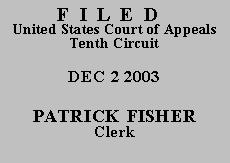

| UNITED STATES OF AMERICA,
Plaintiff-Appellee, |
|
| v. | |
| HARRY GEORGE FRANKLIN,
Defendant-Appellant. |
|
Defendant Harry George Franklin appeals his jury convictions of incest committed in Indian country, in violation of 18 U.S.C. § 1153 and Okla. Stat. tit. 21, § 885, and sexual abuse of a minor under the age of sixteen, in violation of 18 U.S.C. §§ 1153 and 2243(a). We exercise jurisdiction pursuant to 28 U.S.C. § 1291 and affirm.
Franklin's sixteen-year-old granddaughter (the victim) reported to school officials that Franklin had been sexually assaulting her. School officials relayed the information to law enforcement authorities. The victim indicated that Franklin began fondling her when she was twelve years old and over time proceeded to engage in more offensive behavior, including repeated acts of sexual intercourse. Law enforcement authorities searched Franklin's mobile home and seized various items, including a used condom. Scientific DNA analysis revealed that both Franklin's and the victim's DNA were isolated on either side of the surface of the condom. The investigation also revealed that both Franklin and the victim were Indians, and that Franklin's mobile home, where the sexual molestation occurred, was located on tribal land.
As his sole issue on appeal, Franklin contends the district court erred in limiting his cross-examination of the victim regarding what he describes as her "mental condition." We review the district court's limitations on cross-examination of a witness for an abuse of discretion and we will reverse "only if any error affected the substantial rights of the accused." United States v. Begay, 144 F.3d 1336, 1339 (10th Cir. 1998). In doing so, we review de novo whether a defendant's confrontation rights were violated by reason of improper restrictions on cross-examination. United States v. Sinclair, 109 F.3d 1527, 1537 (10th Cir. 1997).
During the government's case-in-chief, the victim testified in detail regarding Franklin's conduct. On cross-examination, defense counsel asked the victim: "During the past three years, was there an incident in the mobile home . . . where you ran down the hallway and you said, 'I'm crazy, I'm crazy, I'm crazy." Tr. at 173. The victim responded, "Yes," but was unable to remember when the incident occurred. Id. Immediately thereafter, government counsel asked for a bench conference and objected to the inquiry. Defense counsel stated that he wanted "to find out if [the victim] sees people who don't exist, talks to people who don't exist, and they talk to her." Id. at 174. The district court sustained the government's objection and prohibited defense counsel from additional inquiry into the proposed subject matter.
Federal courts sometimes permit "the impeachment of government witnesses based on their mental condition at the time of the events testified to." United States v. Butt, 955 F.2d 77, 82 (1st Cir. 1992). However, the decision of whether to permit evidence or cross-examination of a witness regarding his or her mental condition falls within the broad discretion of the district court in attempting to balance possible prejudice versus probative value. See, e.g., United States v. Moore, 923 F.2d 910, 913 (1st Cir.1991) (noting evidence of witness' mental instability, even if relevant, may be excluded on basis of jury confusion or prejudice). "In assessing the probative value of such evidence, [a] court should consider such factors as the nature of the psychological problem, . . . the temporal recency or remoteness of the [mental condition], . . . and whether the witness suffered from the problem at the time of the events to which she is to testify, so that it may have affected her ability to perceive or to recall events or to testify accurately." United States v. Sasso, 59 F.3d 341, 347-48 (2d Cir. 1995) (internal citations and quotations omitted).
After examining the record on appeal in this case, we find no abuse of discretion on the part of the district court in limiting the cross-examination of the victim. Defense counsel did not attempt to ask the victim whether she had ever been treated for mental illness, nor did he attempt to introduce any extrinsic evidence, such as medical records, pertaining to the victim's mental health. See United States v. Smith, 77 F.3d 511, 516 (D.C. Cir. 1996) ("[t]he soundest course . . . is for the District Court to consider the medical history of the specific witness in question so as to render an informed decision regarding the relevance of that history"). Further, during the bench conference regarding the cross-examination of the victim, defense counsel made no proffer of evidence to the district court. Thus, aside from the victim's admission to having once said "I'm crazy, I'm crazy, I'm crazy," there was no indication that the victim had suffered from or been treated for a mental illness that may have affected her ability to accurately perceive or recall the events in question. The district court acted within its discretion in prohibiting defense counsel from inquiring about the victim's mental health.
AFFIRMED.
Entered for the Court
Mary Beck Briscoe
Circuit Judge
*.This order and judgment is not binding precedent, except under the doctrines of law of the case, res judicata, and collateral estoppel. The court generally disfavors the citation of orders and judgments; nevertheless, an order and judgment may be cited under the terms and conditions of 10th Cir. R. 36.3.